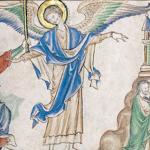The following is an excerpt from the introduction to my Deep Comedy (Canon, 2006).
Viewed as a whole, the Christian account of history is eschatological not only in the sense that it comes to a definitive and everlasting end, but in the sense that the end is a glorified beginning, not merely a return to origins. The Christian Bible moves not from garden lost to garden restored, but from garden to garden-city. God gives with interest.
To say the same in other words, though the Bible gives full recognition to sin and its effects on creation and humanity, the Christian account of history is ultimately comic. The classical world, by contrast, was dominated by a tragic view of history, in which history moved from a glorious beginning toward a tarnished end, and a tragic understanding of the constituent realities of life (a “tragic metaphysics”), manifested in a predominantly tragic literature. As it penetrated the Greco-Roman world, the Christian gospel challenged this tragic classicism (or classical tragicism) by presenting a fundamentally comic vision of history.
“Tragedy” here is used very loosely, as a story in which the characters begin neutrally or well, but slide inexorably to a bad end; “comedy” is a story in which the characters may face dangers, perhaps dangers of great intensity, but ultimately rise to a happy ending.
“Deep comedy” brings two additional nuances: First, in deep comedy the happy ending is uncontaminated by any fear of future tragedy, and, second, in deep comedy the characters do not simply end as well as they began, but progress beyond their beginning. Comedy may move from glory to glory restored, but deep comedy moves from glory to added glory. While the classical world did produce comedy, it did not produce “deep comedy.”
What I mean by “tragedy” and “deep comedy” may best be captured by two biblical citations. “The last state is worse than the first” – Jesus’ saying can serve as a summary of ancient sensibility about history.
“Deep comedy” is best exemplified by the vision of the New Jerusalem in Revelation 21-22, and particularly by Revelation 21:4: “He shall wipe away every tear from their eyes; and there shall no longer be death; there shall no longer be mourning, or crying, or pain; the first things have passed away.”
My second observation is more straightforward: The Christian God is a Triune God. This stands in contrast to all other forms of monotheism and polytheism, ancient and modern.
This small book is an effort to discern a connection these two unique or at least highly idiosyncratic features of Christian faith. Is Christianity eschatologically comic because it is Trinitarian? Is history moving toward a comic climax as a revelation of the nature of the Triune God?
To ask the question from the other end: Is there an “eschatological moment” in the life of the Trinity? Is the life of the Trinity comic? In this book, I sketch the outlines of an affirmative answer to these questions. If Trinitarian theology is an answer to the question, “Given the gospel story, who must God be for this to be possible?” I wish to broaden the question beyond the narrative of Jesus’ life, death and resurrection to ask, “Given the biblical vision of history and eschatology, who must God be for this to be possible?”
The answer is the same in both cases: The immanent Trinity is manifested in and is the ontological ground and condition for the possibility not only for the death and resurrection of the Son, but for a world-history that moves from Eden to New Jerusalem. Paganism’s tragic view of history is allied with a tragic metaphysics and theology, while Christianity has a comic view of history because it has a fundamentally comic theology proper (doctrine of God).
For Greek philosophy tragedy was woven into the fabric of existence, and also that these tragic obsessions are common elements of modern and postmodern thought as well. This discussion will be transposed into a more directly theological key as I examine Jacques Derrida’s treatment of the problems of writing and supplementarity, especially as they arise in Plato, to point out similarities between ancient conceptions of history and “Platonic” metaphysics and theology.
As Derrida shows, it is axiomatic for Plato that supplementarity is degenerative; that is, anything added to an original, anything flowing from a source, is “worse” than the source itself, precisely because it has moved away from the source. This metaphysical assumption is parallel to mythical views of history for which temporal supplementation necessarily means degeneration.
For Platonic and Neoplatonic metaphysics, the lower is always lesser; for Hesiod, Ovid, and other myth-historians the later is always lesser. Such a metaphysics cannot support a comic view of history, much less deep comedy.
Postmodern atheist though he is, Derrida opens the way for a Trinitarian response to the problem of supplementarity by treating the relationship between speaker and text, and between origin and supplement more generally, as a father-son relation. Derrida’s father-son, however, is heretical or even pagan, rewriting Hesiod’s myth of patricidal Zeus and Sophocles’ story of Oedipus as if it were metaphysically necessary.
An orthodox Trinitarian theology avoids the problematics of Platonic supplementarity in two ways. Orthodox Trinitarian theology asserts, first, that there is always a “supplement” (Son and Spirit) with the “origin” (Father), and, second, insists that the Son and Spirit, though “supplemental” to the Father, are “equal in power and glory.” There is no degeneration or “leakage” of glory or divinity as the Father begets the Son or, together with the Son, spirates the Spirit.
Trinitarian theology thus provides theological ground for a view of history where the passage of time does not necessarily mean decay, where history can move from death to life rather than the (common-sensical) reverse.
Thus, for a Trinitarian theology, time and history can be redeemed and brought to comic conclusion. For Trinitarian theology, the “Second” is fully equal to and is in fact the glory of the “First,” and therefore for the Bible, the golden age is always out before us not behind us. Here, as elsewhere, the dominical axiom about protology and eschatology subverts the common sense of antiquity and modernity: “the last first and the first last” (protoi escatoi kai escatoi protoi, Matt 19:30).











